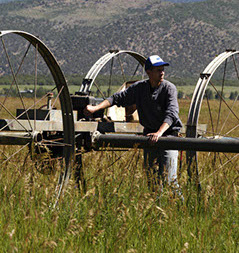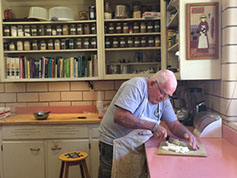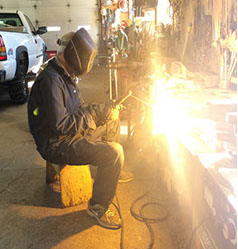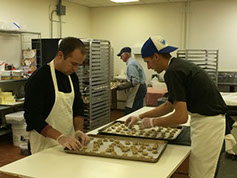













MONASTERY

Br. Evan Bednarz
moving sprinklers

Br. Benito Williamson
chopping onions

Br. Raymond Roberts welding

Br. Erik Keeney, Fr. Charlie Albanese, and Br. Evan Bednarz baking cookies
"
MONKS AND LABOR
WHEN THEY LIVE BY THE LABOR OF THEIR HANDS, as our fathers and the apostles did, they are truly monks” (RB 48). For centuries these words of St. Benedict have provided for Cistercian communities an enduring ideal. The Benedictine motto of ora et labora—prayer and labor—shows the importance of work for those whom “truly seek God” (RB 58). As opposed to valuing work for the apparent profits it may produce, monastic labor is intended to be a graced outgrowth of communal prayer—the Work of God. This does not mean that monks are careless or indifferent in their work; on the contrary, Trappists have a reputation for creating high-quality products, whether it is beer, cheese, fruitcake, mushrooms, or cookies, such as we bake here at St. Benedict’s.
For the majority of Cistercian history, monastic labor has had an agrarian character. At one time at St. Benedict’s the entire community could be seen throughout our 3000-plus acres harvesting hay or rounding up cattle. The ranch is a simpler operation now, but monks continue to irrigate fields for hay and cow pasture. In the summer and fall, guests and visitors are frequently greeted by the lowing of cattle, for whom pasture is leased. In addition to running the ranch, other ministries include a bookstore which serves as the entrance and greeting room for visitors, as well as a retreat facility providing guests with the opportunity to attend the monastery’s daily prayer times or simply enjoy the land the monks have lovingly stewarded for more than sixty years—as Abbot Joseph fondly used to say, the monks are “keepers of the Sacred Valley.”
When a monk is not assigned work, he is encouraged to develop his individual interests and talents, whether that is study, writing, music, photography or carpentry. As St. Irenaeus famously said, “The glory of God is man fully alive, and the life of man is the vision of God.” A monk’s labor is fundamental to his growth as a human being and as a Cistercian monk “preferring nothing whatever to Christ” (RB 72). As the counterpoint to his prayer, a monk strives to cultivate at the heart of his labor a self-offering to God.
According to the old monastic adage:
“You can see how he prays by how he sweeps the floor.” ✜